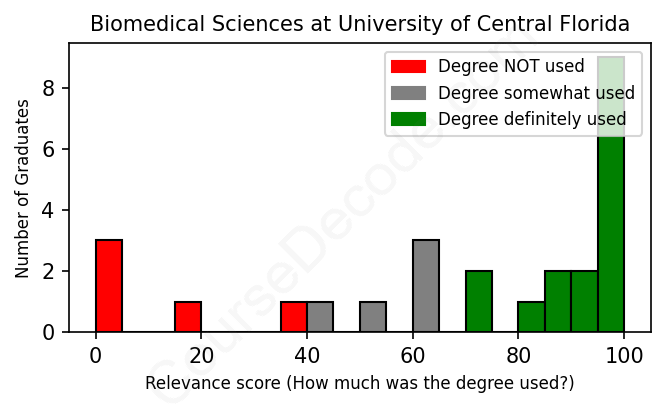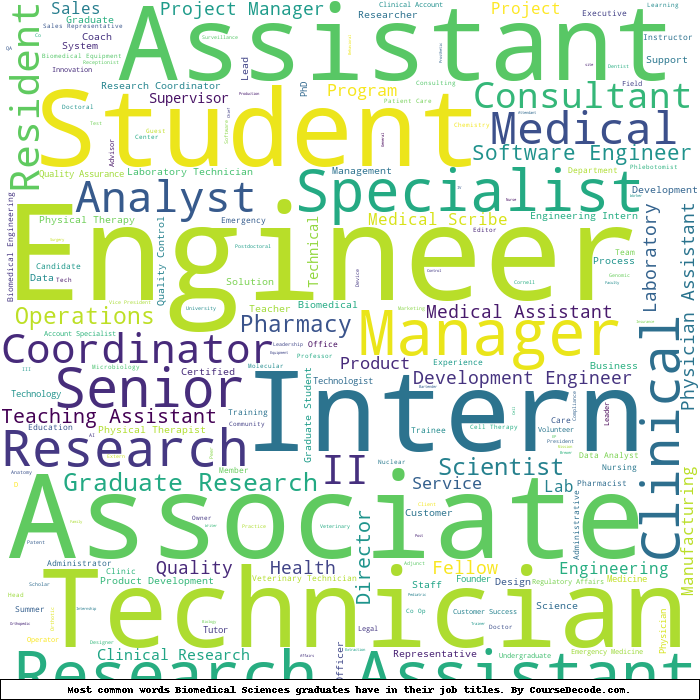
First, some facts. Of the Biomedical Sciences graduates from University of Central Florida we've analyzed , here's how many have used (or NOT used) their degree in their career:

These are estimates based on AI analysis of 26 LinkedIn profiles (see below).
The verdict? Slightly above average. Overall, with an average relevance score of 69%, Biomedical Sciences graduates from University of Central Florida have a slightly higher likelihood (+2%) of finding work in this field compared to the average graduate across all fields:
And for comparison, here's the chart for all profiles we've looked at across all degrees.
Also, after graduating, 53% of these graduates have pursued further education other than another Bachelor's degree (such as a Masters degree or other), compared to the average across all profiles of 35%. This suggests you may need more than just a Bachelors degree to be competitive as a Biomedical Sciences graduate.
See the details:
|
Relevance score: 16% We think this person has NOT gone into a career related to their degree. We think this person has NOT gone into a career related to their degree.
DEGREE INFOGraduated in 2015 from University of Central Florida with a Bachelors Degree in Biomedical Sciences. No other secondary education since. JOB HISTORY SINCE GRADUATIONFront Desk Manager Mesmen Inc Oct 2015 - Jan 2016 Laboratory Technician  GenSol Diagnostics Feb 2016 - Dec 2016 General Manager  Mr Dog Poop Aug 2017 - Jul 2023 Executive Office Administrator  Everglades Accounting Aug 2023 - Present ABOUTI am someone who brings a positive attitude to a work environment and strives to work with my best effort at all times. If I am unfamiliar with something I am not afraid to find the necessary resources to understand. |
The top 10 most common jobs done by the graduates we've analyzed (ranked most common to least) are:
Many graduates from the University of Central Florida’s Biomedical Sciences program have taken a wide variety of jobs after finishing their studies. Some of the most common positions include Medical Assistants, Medical Scribes, and roles in Clinical Research, such as Clinical Research Coordinators or Assistants. These jobs tend to be more relevant to Biomedical Sciences, especially those that involve direct patient care or laboratory work, since they draw on the knowledge and skills acquired throughout the degree program. For instance, Medical Assistants often need a solid understanding of medical procedures and terminology, while Clinical Research positions require a good grasp of scientific methodologies and patient care protocols.
On the flip side, there is a notable percentage of graduates who have pursued paths that don’t directly connect to their Biomedical Sciences education, like administrative roles or positions in unrelated fields, such as food service. Many jobs, like teaching or office managing, do utilize some transferable skills—like analytical thinking or organization—but they lack a strong connection to the specialized knowledge from Biomedical Sciences. Overall, while there are definitely opportunities to work closely within the field, a significant number of graduates find themselves in positions that don't fully utilize their background in Biomedical Sciences.
Here is a visual representation of the most common words in job titles for Biomedical Sciences graduates (this is across all Biomedical Sciences graduates we've analyzed, not just those who went to University of Central Florida):

Looking at the career trajectories of graduates from the Biomedical Sciences program at the University of Central Florida, it seems like there’s a mix of paths people are taking after graduation. For many, the first jobs tend to be in healthcare-related positions, such as medical scribes, medical assistants, or lab technicians—roles that provide valuable entry-level experience in the medical field. However, there’s also a notable number who seemed to veer off and took jobs in management or entirely unrelated fields like teaching or customer service right after college. This kind of diversity suggests that while a lot of graduates find their way into careers relevant to their degree, others explore different avenues, potentially because they didn’t immediately secure positions in the biomedical sciences sector.
As these individuals advance a few years into their careers—five to ten years later—they start to specialize more in the health and research areas, with many becoming involved in roles like clinical research coordinators, resident doctors, or laboratory generalists. It's encouraging to see a number of them climb the ladder within the biomedical or healthcare industries, which aligns well with their educational background. However, there are also folks who seem to remain in peripheral roles, like office management or customer service, which may not directly utilize their biomedical training. Overall, while there’s a solid representation in relevant and important careers, there’s enough variance in paths that suggests some graduates might not find a direct line to the field they studied, at least initially.
Honestly, a Bachelor’s degree in Biomedical Sciences can be pretty challenging, but it really depends on your background and how much effort you're willing to put in. At the University of Central Florida, you can expect a mix of hard science courses, like biology, chemistry, and anatomy, which require a good grasp of concepts and sometimes a lot of memorization. There’s also a fair amount of lab work, and that can be time-consuming. If you’re into science and enjoy digging deep into the material, you might find it manageable. But if you’re not really into all those subjects, it could feel pretty tough. Overall, it’s about average in terms of difficulty for a science degree—definitely doable if you stay organized and dedicated!
Most commonly, in the LinkedIn profiles we've looked at, it takes people 4 years to finish a Bachelor degree in Biomedical Sciences.
So, looking at the job trajectories of these Biomedical Sciences grads from UCF, it seems like their earnings are pretty varied. For example, those who started off as Medical Scribes and Medical Assistants typically earned lower salaries initially, which is common in entry-level healthcare roles. But we can see some of these folks have worked their way up to more lucrative positions, like Resident Doctors or Operations Managers, suggesting they definitely have the potential to make decent money as they gain experience. On the flip side, some grads have roles like Front Desk Manager and Customer Care Representative, which might not pay as well. Overall, it looks like the ones who stuck it out in healthcare or moved into managerial roles are likely doing pretty well, but not everyone is raking it in. It's all about how you leverage your degree and the jobs you take along the way!
Here is a visual representation of the most common words seen in the "about" section of LinkedIn profiles who have a Bachelor degree in Biomedical Sciences (this is across all Biomedical Sciences graduates we've analyzed, not just those who went to University of Central Florida). This may or may not be useful:

Here are all colleges offering a Bachelor degree in Biomedical Sciences (ordered by the average relevance score of their Biomedical Sciences graduates, best to worst) where we have analyzed at least 10 of their graduates:
| College | Score | Count |
|---|---|---|
 Western Michigan University Western Michigan University
|
81 | 17 |
 Marquette University Marquette University
|
78 | 29 |
 University of Michigan University of Michigan
|
77 | 10 |
 Colorado State University Colorado State University
|
77 | 19 |
 University at Buffalo University at Buffalo
|
75 | 18 |
 California Polytechnic State University-San Luis Obispo California Polytechnic State University-San Luis Obispo
|
74 | 13 |
 University of Connecticut University of Connecticut
|
74 | 15 |
 Texas A&M University Texas A&M University
|
73 | 59 |
 Auburn University Auburn University
|
71 | 26 |
 Northern Arizona University Northern Arizona University
|
71 | 15 |
 Rensselaer Polytechnic Institute Rensselaer Polytechnic Institute
|
70 | 10 |
 University of Central Florida University of Central Florida
|
69 | 26 |
 University of South Florida University of South Florida
|
68 | 48 |
 Georgia Institute of Technology Georgia Institute of Technology
|
67 | 41 |
 The Ohio State University The Ohio State University
|
64 | 14 |
 Rochester Institute of Technology Rochester Institute of Technology
|
64 | 12 |
 Case Western Reserve University Case Western Reserve University
|
63 | 12 |
 Grand Valley State University Grand Valley State University
|
59 | 35 |
 Arizona State University Arizona State University
|
58 | 12 |